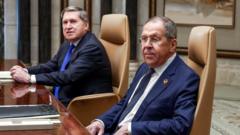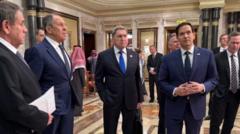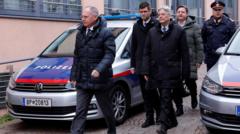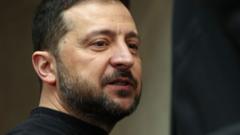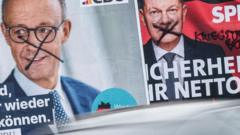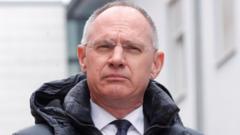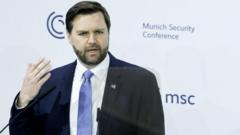Coalition negotiations flounder as the Freedom Party's leader blames disputes over ministerial positions for the stalemate, leaving four potential paths for Austria's political future.
Austria's Freedom Party Ends Coalition Talks, Political Crisis Deepens
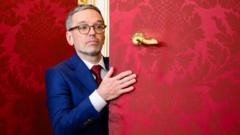
Austria's Freedom Party Ends Coalition Talks, Political Crisis Deepens
The far-right populist party's failure to form a government leaves Austria facing uncertain political futures.
Austria's political landscape has further complicated as its far-right populist party, the Freedom Party (FPÖ), announced it has halted attempts to establish a coalition government with the conservative People's Party (ÖVP). This announcement comes after an intense negotiation period and follows a previous failure to create a workable alliance after September's elections.
Initially, the ÖVP aimed to form a three-party coalition with the Social Democrats and the liberal NEOS, but both initiatives faltered. The Freedom Party's leader, Herbert Kickl, attributes the breakdown of negotiations to the ÖVP's insistence on specific ministerial appointments, expressing regret at relinquishing the mandate intended to produce Austria's first far-right-led government since the FPÖ's establishment in the 1950s, arising from former Nazi affiliations.
In the September election, the FPÖ achieved a historic win, securing 28.8% of the vote and narrowly surpassing Chancellor Karl Nehammer's ÖVP, which received 26.3%. Subsequently, negotiations initiated in October with Nehammer's appointment concluded abruptly in January, leaving interim Chancellor Alexander Schallenberg to step in.
After unsuccessful attempts to negotiate a coalition without the Freedom Party, President Alexander Van der Bellen eventually assigned the mandate for government formation to Kickl on January 6. In recent days, public statements from both parties hinted at escalating tensions, signaling difficulties in reaching an agreement. The FPÖ sought crucial ministries including finance and interior, prompting the ÖVP to demand reassurances of no Russian influence in Austria and adherence to EU obligations.
Kickl expressed disappointment in a statement concerning the unmet negotiations, highlighting that despite making concessions on several points, the ÖVP's rigid stance made an agreement impossible. Meanwhile, ÖVP General Secretary Alexander Pröll criticized Kickl's leadership style, claiming he prioritized personal power over cooperative governance.
Political analyst Thomas Hofer noted a prevailing "lack of trust" hampering the negotiations, explaining that Kickl's rigid strategies drew comparisons to former U.S. President Donald Trump's difficult coalition-building tactics. Ultimately, the ÖVP deemed the risk of an uncontrolled Chancellor Kickl, without solid trust, as too significant.
In response to the failed coalition talks, President Van der Bellen outlined four potential pathways for Austria: new elections, a minority government, a coalition of experts, or another negotiation attempt among parliamentary parties. He plans to engage with political stakeholders over the following days to determine viable options moving forward, emphasizing the importance of compromise in a democratic framework.
Initially, the ÖVP aimed to form a three-party coalition with the Social Democrats and the liberal NEOS, but both initiatives faltered. The Freedom Party's leader, Herbert Kickl, attributes the breakdown of negotiations to the ÖVP's insistence on specific ministerial appointments, expressing regret at relinquishing the mandate intended to produce Austria's first far-right-led government since the FPÖ's establishment in the 1950s, arising from former Nazi affiliations.
In the September election, the FPÖ achieved a historic win, securing 28.8% of the vote and narrowly surpassing Chancellor Karl Nehammer's ÖVP, which received 26.3%. Subsequently, negotiations initiated in October with Nehammer's appointment concluded abruptly in January, leaving interim Chancellor Alexander Schallenberg to step in.
After unsuccessful attempts to negotiate a coalition without the Freedom Party, President Alexander Van der Bellen eventually assigned the mandate for government formation to Kickl on January 6. In recent days, public statements from both parties hinted at escalating tensions, signaling difficulties in reaching an agreement. The FPÖ sought crucial ministries including finance and interior, prompting the ÖVP to demand reassurances of no Russian influence in Austria and adherence to EU obligations.
Kickl expressed disappointment in a statement concerning the unmet negotiations, highlighting that despite making concessions on several points, the ÖVP's rigid stance made an agreement impossible. Meanwhile, ÖVP General Secretary Alexander Pröll criticized Kickl's leadership style, claiming he prioritized personal power over cooperative governance.
Political analyst Thomas Hofer noted a prevailing "lack of trust" hampering the negotiations, explaining that Kickl's rigid strategies drew comparisons to former U.S. President Donald Trump's difficult coalition-building tactics. Ultimately, the ÖVP deemed the risk of an uncontrolled Chancellor Kickl, without solid trust, as too significant.
In response to the failed coalition talks, President Van der Bellen outlined four potential pathways for Austria: new elections, a minority government, a coalition of experts, or another negotiation attempt among parliamentary parties. He plans to engage with political stakeholders over the following days to determine viable options moving forward, emphasizing the importance of compromise in a democratic framework.

